

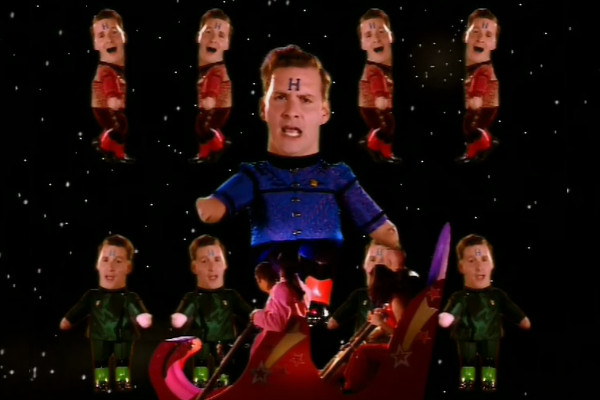
Doug Naylor has a degree in psychology, and this is a more thoughtful episode that even namechecks Freud. Sure, a Lister-Rimmer kiss and the "munchkin song" are both a little broad and twee, but this is a rare series seven episode that actually has a working punchline. The co-writer here is Kim Fuller, who wrote films and TV of varying quality from Spiceworld (underrated, to be fair) and Alas Smith and Jones.
The Rimmer song kind of works, though some may find it a little too cheesy. Sung by series composer Howard Goodall, his voice could be heard on every title sequence from series three onwards as he sang the title of the series four times through a vocoder. Recently revealed, this aural "Easter Egg" can be first heard from around 14 seconds in to every episode, one of those elements that, had you not heard it before, once you hear it you'll wonder how you never spotted it.
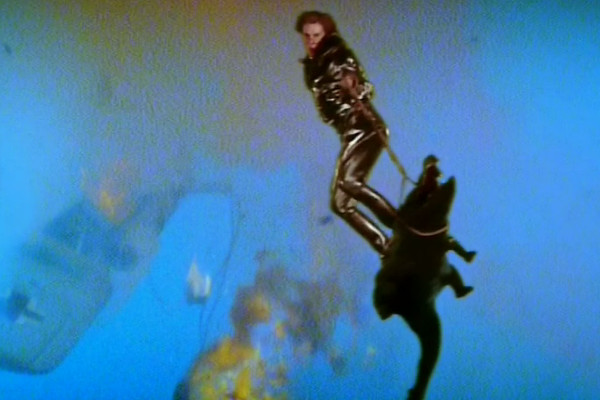
Ace Rimmer was a jarring addition to the Red Dwarf universe, RD's very own Lord Flashheart. Suddenly stories weren't "real" within their own confines, but every week became a Parallel Universe-level comic strip. Stoke Me A Clipper, the highlight of series seven, takes the format-corroding silliness of the character and smashes so many fourth walls it no longer matters. Put simply, Stoke Me A Clipper is SO over-the-top it finally all clicks.
The first of five episodes with Paul Alexander as co-writer (Epideme/Nanarchy/Krytie TV/Pete Part 2) it's easily the best. A four minute sequence of Lister in a computer simulation cheating sex with a computerised Sarah Alexander shows Alexander's more immoral, obnoxious side, and the entire plot - Rimmer becomes the new Ace - is a little unlikely, but it works... just about. It's sad that this is the final time the real Rimmer ever appeared in Red Dwarf, and maybe a little cruel that Lister allows Cat and Kryten to think that he died, but for a way to see off an actor who no longer wanted to be in the series, it's a decent step.
Sadly, the emotional payoff, with a planet ring full of deceased light bees, is undermined by series seven's usage of cheap CGI, a serious blight on an otherwise great-looking series. (The cheap special effects elsewhere are all part of the joke, and work well). The visuals are supposed to be awe-inspiring, but instead look like a screenshot from Captain Kremmen.
There's nothing here good enough to match the first four minutes of pre-credits silliness, but the rest of it stands above what follows. There have been over twenty better episodes before Stoke Me A Clipper; sadly, Blue aside, afterwards there haven't been any that have come close.
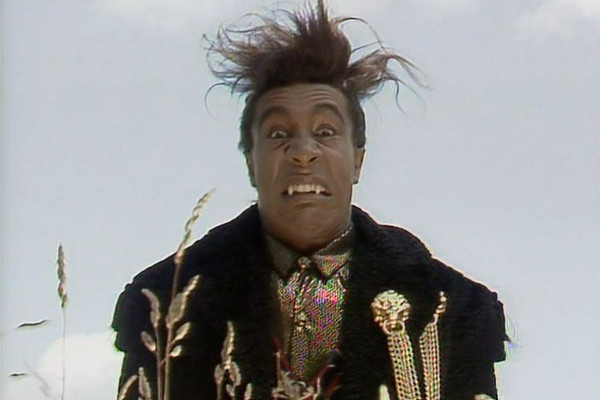
Series three brings in the most ever changes between seriess, particularly as it aired just 13 months after series two. Perhaps the most jarring is not the new characters (including Holly using the face of his female counterpart from Parallel Universe after Norman Lovett left the series) but the huge upscale in budget after Grant-Naylor took over production themselves.
The fannish part of viewers may hope for a scene where the grey sets are shown as being a lower part of the ship after they moved up to the officer's quarters but, perhaps sensibly, Red Dwarf was still primarily a comedy series at the time (as opposed to a sci-fi series with jokes) and so all the many changes are brushed aside as a quick gag with a Star Wars scroll text that's too fast to read. (Such continuity-based concerns were finally addressed, many years later, with the grey bunkroom recreated in both 1999 and 2017... proving, perhaps, that such things are better left well alone. It's the same kind of reasoning that explains how Rimmer, a hologram, is able to change costume as part of The Sensational Reverse Brothers.... it simply doesn't matter.)
Backwards itself definitely has its moments, with some decent dialogue sequences... mainly Lister describing how different certain folk heroes would seem in a backwards world, and not the somewhat self-conscious Flintstones scene. For the most part, though, it's a bit of a one-joke affair, as various people are shown doing things in reverse via video trickery, as Rimmer watches on in that horrible "Captain (green) Scarlet" outfit. With Rimmer and Lister apart for the majority of the episode, it's an odd way to start a series, as it removes most of what made the programme so successful in the first place. The commentary track has Llewellyn suggest that it's a classic episode, only for Chris Barrie to remark that it's "not one of my favourites, personally", and is met in agreement by Craig Charles.
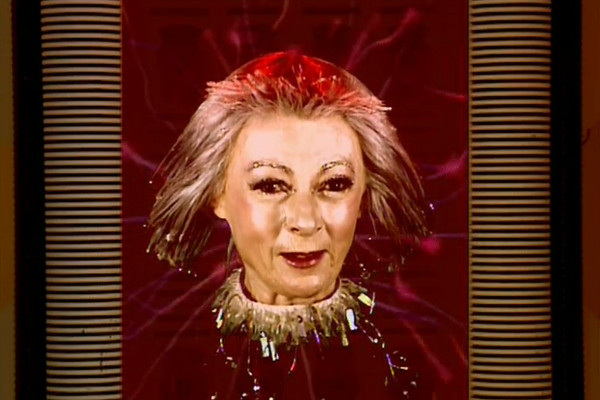
Cassandra upholds its reputation as the sole "non-rubbish series eight episode". Featuring a superb guest turn from Geraldine McEwan as the titular computer, it wouldn't be the first time predetermination had played a part in a Red Dwarf episode, and, thanks to the Dave Channel episode Fathers and Suns, it wouldn't even be the last time that a future-predicting computer would play a part.
There are applause breaks in the episode, but somehow, with the more OTT atmosphere, it just about pays off. Rimmer's delight that he'll be murdered while making love to Kochanski is faintly ludicrous, but works because of Barrie's energetic performance. With the presence of Jake Wood as the silly (yet vaguely amusing) character "Kill Crazy", the episode presents Red Dwarf audiences with arguably the guest star who went on to the biggest fame after their appearance... unknown at the time, he went on to be watched by millions as Max Branning in EastEnders. In America he was most famous as the voice of the GEICO gecko, and this episode was the first of five to be screened in the States before its UK debut.
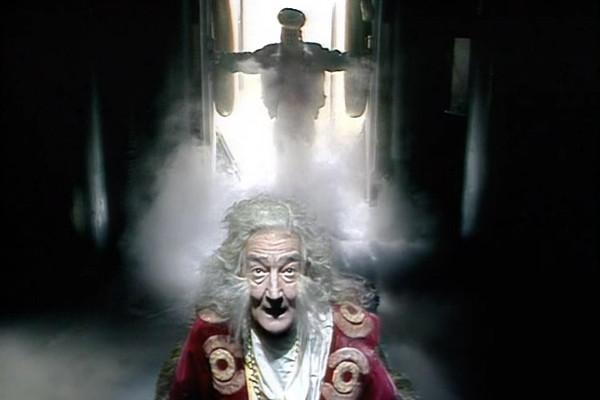
While there's a lot to enjoy in Waiting For God, much of Rimmer's comedy is the "instant reverse" humour that the later seriess would overrely on, and the religious satire, while commendable, can be a little "on the nose". But in terms of inspiration, Lister coming to terms with the fact that he is the God of the Cat race is a strong core concept.
Noel Coleman makes an excellent guest cast member as the dying cat priest, and, even if Danny John-Jules's accent falters at points, it's worth remembering that series one is where Cat actually acted like a cat. He doesn't get many highlights in an episode ostensibly about him, but "catch that string" has to be one of them. Rewatching these early episodes, where the character actually had drives and his own culture, it's saddening to realise that this is the same character who has been placed on a continual loop of "fashion" and "dumb" gags since the 90s.
Those who look for continuity in the increasingly contradictory Red Dwarf should be drawn to Rimmer's line about "imagine making love to a woman"... accidentally revealing that he's still a virgin, something contradicted just the following week. (Lovers of trivia may also note that dialogue in this episode reveals that it's set on a Saturday, 18 weeks after the events of The End.)
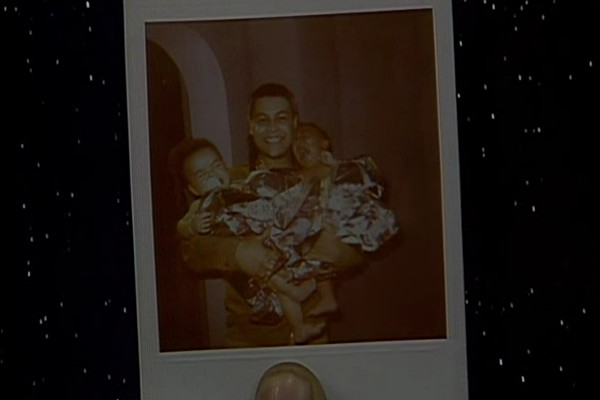
Future Echoes was recorded fourth in mid-October 1987, but brought forward in the running order to air second, as it was regarded as a stronger entry than either Balance of Power or Waiting For God. It's traditionally one of the most-regarded series one episodes in fan polls, sometimes even being rated as its highest peak. It showcases Holly more than in any of the first four episodes, and contains a clever plot based around visions of time, something Grant-Naylor always did well. However, while acknowledging that the episode is inventive, and well developed as a narrative, it has to be noted that it also has more flaws than many other series one episodes, and so appears lower here than you might expect.
There's the fact that the writers still haven't quite got into their stride in terms of the humour of the programme. Series one is commendable because it's genuinely inspired in places, and has real thought behind it... but it isn't commendable because it's particularly funny. While Future Echoes is much-remembered due to the drama surrounding Lister's destiny, and scenes where he talks to Rimmer without him being present, what's sometimes forgotten is that great chunks of the opening minutes see desperate attempts to cram "comedy" into the show, with Rimmer in a silly wig and much mugging.
Chris Barrie is a real asset to Red Dwarf, though is seemingly encouraged to overplay in lots of series one, where he hasn't quite found the character. He's not alone, as both Charles and John-Jules appear to be playing directly to the audience on more than one occasion in the runtime here. (In his defence, Barrie jokingly mocks his own acting on the DVD commentary as "ham salad city").
Yet the biggest factor holding Future Echoes back is a lack of real thought gone into the plot mechanics... Lister discovers he won't actually be killed in the future by an explosion, the vision of his death was actually that of one of his yet-to-be-born twin sons. That Lister takes this in his stride and sees it as something to celebrate is a great misstep in an innovative episode that does lack a clear direction.
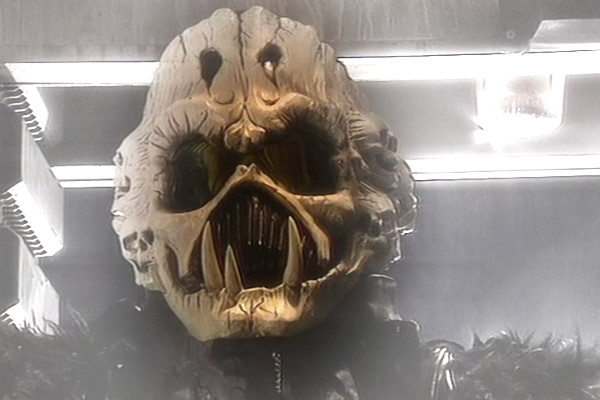
The Inquisitor is probably the most drama-heavy of all the series five episodes, where the comedy is largely left on the cutting room floor to make way for a more adventure-orientated time travel story. It's fairly involving, though the lack of real comic intent does make rewatches less rewarding. Jack Doherty marks the third performer from sketch show Absolutely to appear in the series, after Morwenna Banks played a lift hostess in Statis Leak, and Gordon Kennedy played another villain, Hudzen, in The Last Day.
Docherty's character doesn't specialise in funny lines and, while the special effects surrounding him are hugely advanced from those used in the earlier series, they've still aged in the interim, proving that while humour can date, nothing can date as quickly as CGI. Today's state-of-the-art is tomorrow's cheap, and so characterisation and story have to take precedence.
It's also notable that continuity again doesn't quite make sense: Rimmer starts the episode in his green uniform, but ends it, after time has been put right, in his red one. Or how about the opening, where "Thomas Allman" is put to death - without the trial that the Inquisitor gives to everyone else? Then there's the final punchline, which sees Lister have a severed hand in his jacket, despite the fact that said hand should no longer exist.
Red Dwarf perhaps never specialised in final punchlines, and certainly they began to get very poor from series six onwards, but here it's a desperate need for one that overrides any kind of internal logic. Which would be fine in earlier series, perhaps, but not series five where the show has suddenly began to take its SF plots very seriously...
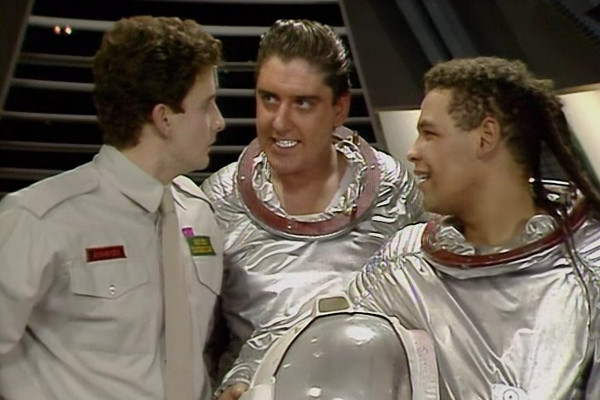
Confidence and Paranoia sees the characterisation of the series begin to hit its stride. It's here that Lister's sensitive and preachy tendencies are introduced, as well as Rimmer's encounter with Yvonne McGruder and the existence of Dream Recorders. It also shows Rimmer being slightly protective towards Lister, even if his lack of interest in the embarrassing tales that Lister's Paranoia has to offer is, perhaps, slightly out of character. And in an episode with many great Cat moments, you also get to see Craig Charles break character and smirk on camera when Cat finds him "unconscious" on the floor.
Red Dwarf isn't a series crammed with high profile guest stars, although the likes of Brian Cox, Jenny Agutter and Don Warrington have had small roles. Some of the guest cast, most notably Jake Wood and Graham McTavish, have since gone on to far greater fame after appearing in the series. Another who fits this bill is Craig Ferguson, a comedian making his first acting appearance as the American-accented Confidence, who would eventually find fame in America, ironically with his real Scottish accent.
The misguided attempt in 1998 to "remaster" the first three series to fall in line with the rest saw changes to three of Norman Lovett's gag introductions. The original line here that the lowest form of man is a man from the post office was changed to a meandering tale about the crew waking someone from cryogenic sleep and telling them that they couldn't help him. The original gag sequence was later reworked for the remastered Better Than Life, which saw it changed to the lowest form of life being a man with a train set.
In fairness, the attempts to "modernise" some gags had a logical basis behind it: Better Than Life's original gag talked about Berni Inns (converted to other franchises by 1995) and Statis Leak's reference to Felicity Kendal was changed to Marilyn Monroe. Unfortunately, filmed ten years later and without a studio audience, Lovett's redone Holly moments fail to match up with the original footage, and contain far flatter delivery than even his normal dead-pan style requires.
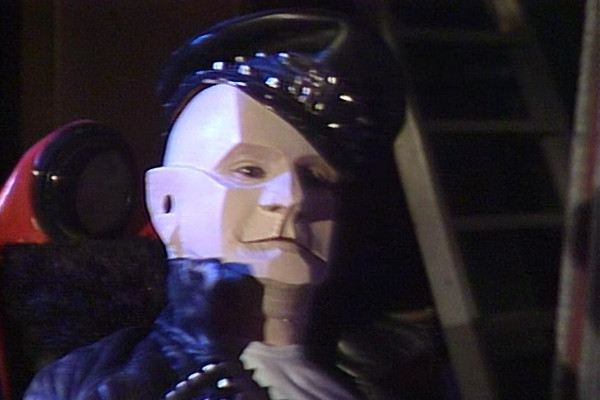
Series two of Red Dwarf was generally screened in the order in which it was recorded, except for the two broadest, most crowd-pleasing episodes being placed at the start and end of transmission. Kryten is an episode with an audience so amped-up that there's no less than a dozen applause breaks (with a further two attempted by a single audience member) and a girl in the audience notably shrieks throughout.
It's a bit more "mainstream" than what came before, but it's also the start of Red Dwarf's finest series. Suddenly the series has jokes, and, while not the most depth-filled episode, it adds more layers to Rimmer. Although he's still obnoxious (and inexplicably blessed with the gift of smell), there's a moment where the audience audibly cry out "ahhhhhhh" in sympathy for him, something that would have been unthinkable for the majority of series one.
Of note is that Rimmer calls himself "Ace", which would be reused for his alter ego in series four, and there's a scene where he confuses Esperanto... just five years later and this schtick would be transformed into "Space Corp Directives" and make up approximately 90% of the jokes in series six.
David Ross plays a very different version of Kryten to the one that began to take over the show from series three onwards... Norman Lovett states on the commentary track that David was unimpressed with the credentials of the cast, but Ross and Barrie can clearly be witnessed on the verge of laughter during their final scene together.